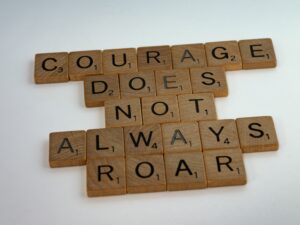The clinicians at CCDBT have written numerous blogs about shame, likely because we all have a wealth of experience working with people who see themselves as “less than” or “not enough.” One way to combat shame is to build self-respect, and DBT has a skill specifically designed to help people do exactly that. The FAST skill, one of many acronyms in DBT, guides individuals in figuring out how to navigate relationships to improve their self-respect. Among the other skills in DBT, I find this skill to be very difficult because it’s all about balancing my own well-being and the well-being of others. If I focus too much on myself, I lose sight of my connections with others and fail to nurture or even harm those relationships. If I focus too much on others, I overextend myself which is unsustainable at best. As a person who has been brought up to put others first, I have needed to practice FAST to figure out the right balance. With FAST, you can choose a course of action that will leave you feeling comfortable about the way you handled a situation.
FAST stands for (be) Fair, (no) Apologies, Stick to your values, and (be) Truthful
(be) Fair
Be fair to yourself and the other person. Make sure you validate your own feelings and theirs. This part of the skill can be difficult for me, especially if I’m angry with the person. Without FAST, I’m likely to lash out or shove down my anger. By validating my own anger and their behavior, I can find a way to address what I’m feeling in a way that highlights my own and the other person’s humanity. Balancing our feelings and wishes with the other person’s feelings and wishes ensures we can move forward in a peaceful and effective way.

(no) Apologies
Do not apologize for your feelings, beliefs, or behaviors (unless you did something against your own values). No apologizing for being alive or having needs or desires! Apologizing too much is a very common behavior, especially among minorities and women. Sometimes over-apologizing hurts relationships because the other person feels uncomfortable. As an act of validating yourself, change your posture and words to emphasize self-respect and avoid apologizing.
Stick to Your Values
One way to build self-respect is to maintain integrity. Sometimes, it can be tempting to give in to someone’s requests even if it’s not in line with your values. Other times, it might feel impossible to resist the urge to react in a less-than-ideal way when emotions get high. However, the more you can be clear about and practice your values, the stronger your self-respect will be. There might be emergency situations which require you to do whatever you need to do for survival’s sake. Beyond those rare occurrences, stick to your values.

(be) Truthful
The more vulnerable we are in relationships, the closer we become. Be honest is sometimes the most vulnerable thing a person can do. By being honest about your limitations, we can avoid placing ourselves in situations where we’re over-extending and building regret. Honesty our capabilities prevents us from appearing helpless or exaggerating our needs. Balancing being truthful about our limitations and our abilities allows a person to build a strong sense of self-respect.
If you’d like to learn more about using FAST building self-respect and other DBT skills, consider scheduling an appointment with one of our clinicians!

